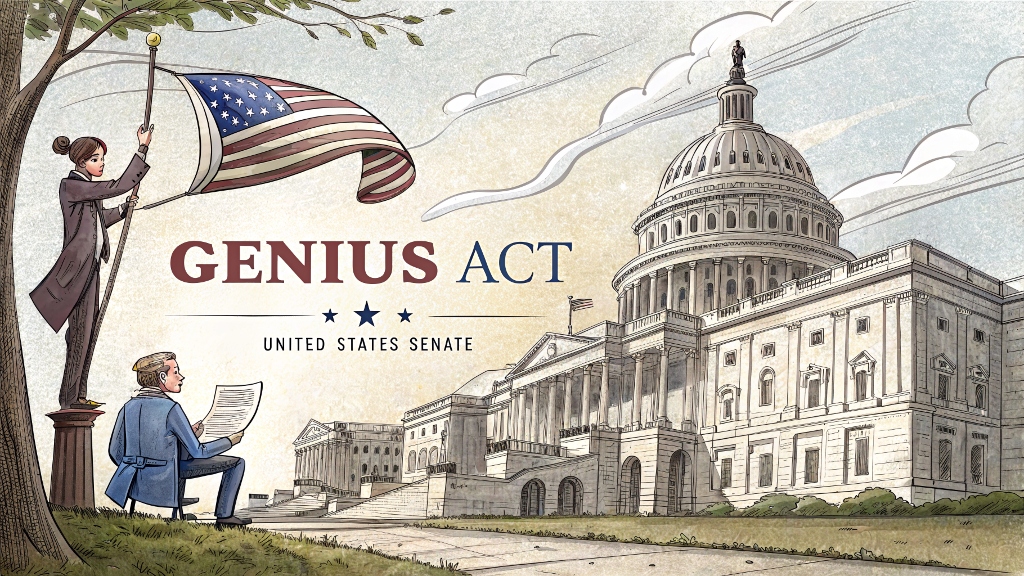
New Legislation Paves the Way for 24-Month Safe Harbor for Crypto Innovators as Stablecoin Oversight Tightens
In a landmark moment for the cryptocurrency industry, the U.S. Senate has passed the Guiding and Establishing National Innovation for U.S. Stablecoins (GENIUS) Act with robust bipartisan support. The bill, which passed by a vote of 68–30 on June 17, 2025, introduces a groundbreaking 24-month regulatory safe harbor for blockchain startups—a move designed to accelerate innovation while balancing consumer protection in the rapidly evolving digital asset space.
A Long-Awaited Legislative Milestone
For years, blockchain entrepreneurs and tech visionaries have advocated for clearer regulatory pathways, arguing that uncertainty stifles American innovation. The GENIUS Act is the culmination of extensive negotiations and industry engagement, spearheaded by Senator Bill Hagerty (R-Tenn.) and co-sponsored by a bipartisan group including Senators Cynthia Lummis (R-Wyo.) and Kirsten Gillibrand (D-N.Y.). The legislation arrives at a time when the crypto industry’s political influence has reached new heights, with significant investments in the 2024 election cycle resulting in the most crypto-friendly Congress to date.
At the heart of the GENIUS Act is the safe harbor provision, which grants blockchain startups a two-year grace period to develop and test decentralized networks without immediate fear of federal securities law enforcement. This window is intended to allow innovators to refine their technologies and business models before facing the full weight of regulatory compliance. Industry experts, including analysts at Metal Pay, have hailed the provision as a potential catalyst for a new wave of Web3 entrepreneurship, reducing the legal ambiguity that has long discouraged both founders and investors.
Understanding the Safe Harbor Mechanism
The safe harbor provision is structured to maximize opportunity for genuine innovation while maintaining safeguards against fraud. Under the law, blockchain startups will have 24 months from the effective date to launch functional networks without being subject to SEC enforcement for unregistered securities offerings. To qualify, projects must file regular development updates with the Treasury Department, adhere to strict anti-fraud regulations, and refrain from public token sales until they have achieved full compliance.
The safe harbor is designed to be accessible to early-stage ventures, with eligibility limited to projects that have fewer than 2,000 users or manage less than $10 million in assets. This threshold ensures that the provision benefits true innovators rather than large, established companies or speculative ventures. The approach mirrors successful tech policy initiatives of the past, such as the JOBS Act, which similarly eased funding rules for startups and small businesses.
Stablecoin Oversight: Strengthening Consumer Protections
While the safe harbor is a boon for startups, the GENIUS Act also introduces comprehensive oversight for stablecoin issuers. Stablecoins—digital assets pegged to fiat currencies—must be backed by one-to-one reserves in U.S. dollars or government securities, with issuers required to undergo monthly audits to verify their holdings. These measures are intended to ensure that stablecoins remain fully redeemable and to prevent the kind of liquidity crises that have plagued other financial instruments.
The legislation also mandates robust anti-money laundering and know-your-customer protocols for stablecoin issuers, requiring them to monitor transactions and screen for sanctions violations. Issuers will be subject to federal oversight through the Office of the Comptroller of the Currency for larger operations, while smaller issuers will be regulated at the state level. Foreign stablecoin issuers seeking to operate in the U.S. will need to demonstrate that their home jurisdictions maintain regulatory standards equivalent to those required domestically.
In addition to these requirements, the GENIUS Act grants the Treasury Department significant new powers to freeze or seize stablecoins used for illicit purposes, with penalties for non-compliance reaching up to $1 million per day. Treasury officials have expressed optimism that these measures will help the stablecoin market grow to an estimated $2 trillion within the next decade, up from its current size.
Industry and Political Responses
The passage of the GENIUS Act has been met with enthusiasm from the crypto industry, which views the legislation as a validation of blockchain technology’s economic potential. Major companies such as Shopify and Bank of America have already begun integrating stablecoin payments into their platforms, and industry analysts predict that the new regulatory clarity will spur further adoption and investment.
Senator Cynthia Lummis, a key supporter of the bill, described the Senate’s action as a critical step toward ensuring American leadership in the next generation of financial technology. “This isn’t just about stablecoins,” she said during floor debates. “It’s about America leading the next financial revolution.”
Critics, including Senator Elizabeth Warren (D-Mass.), have raised concerns about the bill’s anti-money laundering provisions, arguing that they may not be sufficient to address cross-border threats. In response, the legislation requires the Financial Crimes Enforcement Network (FinCEN) to develop advanced, AI-driven surveillance tools within 90 days of enactment, aiming to stay ahead of evolving illicit finance tactics.
Next Steps and Market Impact
With Senate approval secured, the GENIUS Act now moves to the House of Representatives, where it will be reconciled with competing legislation such as the STABLE Act, which emphasizes stricter capital requirements for issuers. Key points of negotiation include the duration of the safe harbor period—some House lawmakers have proposed shortening it to 18 months—and the types of assets that can be used to back stablecoins, with debates over whether non-cash assets like Treasuries should be permitted.
The legislation’s progress is being closely watched by industry leaders, who believe that regulatory clarity is essential for unlocking the full potential of blockchain technology. Companies at the forefront of blending blockchain with other emerging technologies, such as artificial intelligence, are particularly optimistic about the opportunities the GENIUS Act could create.
A New Chapter for American Fintech
The GENIUS Act represents a pivotal shift in the U.S. approach to digital assets, formalizing the country’s role in the global digital economy. By shielding innovators during critical development phases while imposing robust oversight on more mature products, the legislation strikes a careful balance between fostering innovation and protecting consumers. As other major economies, such as the European Union, implement their own comprehensive crypto frameworks, the GENIUS Act signals America’s commitment to remaining at the forefront of financial technology.
For blockchain startups, the safe harbor provision offers a rare opportunity to build and test new ideas without the constant shadow of regulatory uncertainty. For the broader industry, the GENIUS Act provides the clarity and stability needed to attract investment, drive adoption, and ensure that the United States remains a global leader in the digital asset revolution. As the bill moves through the final stages of the legislative process, all eyes are on Washington to see how this new chapter in fintech history will unfold.














